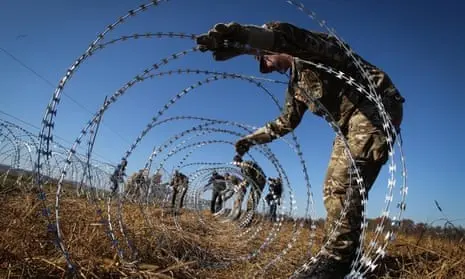9 Jul 2024
Futurescapes Issue 2 – MENA at a Crossroads: Unveiling Looming Risks
At this pivotal juncture, the MENA region stands at a critical crossroads. The region is experiencing a decisive moment that will shape the future dynamics of inter-country relations and regional security, which has faced significant threats in recent years. This publication, prepared by a team of experienced researchers at the renowned Al Habtoor Research Centre, endeavours to forecast the Middle East's impending challenges. It aims to delineate the region's comprehensive political, economic, and security landscape over the past years.
Through a series of incisive analyses, we address the geo-economic challenges and their profound impact on the future of the Middle East and North Africa. These analyses are situated within the context of the sweeping transformations occurring in the global system, a system characterised by economic conflicts that both influence and are influenced by ongoing security and military escalations. These conflicts have altered the global power map and are anticipated to significantly reshape the current world order, making our research all the more pertinent.
Moreover, we examine the risks engendered by the prevailing state of uncertainty, which threatens nations' economic prospects and disrupts critical and vital trade corridors and routes such as the Suez Canal, Bab El Mandab, and the Strait of Hormuz. These corridors are indispensable to global energy security and international trade. The manifestation of these threats is evident in the tensions and conflicts we have observed in the Red Sea, which have heightened fears of potential disruptions escalating into broader military confrontations.
The publication further delves into the new frontiers of warfare, particularly the transformations imposed by cyberspace on the nature and strategies of conflicts. These changes have redefined armament and deterrence methods, yet the region remains significantly unprepared for these evolving threats. At a time when the Middle East is increasingly becoming an attractive target for cyber-attacks and unconventional warfare, there is an urgent and pressing need to enhance preparedness for such confrontations.
In the region’s prevailing instability and escalating political and security tensions, which have precipitated severe humanitarian crises, the migration challenge has surfaced as a critical determinant of the region’s future. Prominent among these tensions are the civil war in Sudan, the ongoing instability in Lebanon, and the conflict in Gaza. Additionally, the continuous deterioration of internal situations in Syria, Libya, Iraq, and Yemen has posed significant challenges for neighbouring countries. These conflicts have profoundly affected migration dynamics in the region, resulting in substantial security and political ramifications that are expected to unfold in the coming period. The migration issues also present vulnerabilities and potential entry points for external agendas to influence aid-receiving nations.
In this context, the region's climate change challenges also invite external actors to impose their agendas. These actors often condition their support and assistance for addressing climate change on political and security changes, thereby imposing different priorities on the region's countries and threatening its stability.
Ultimately, this publication represents the culmination of extensive brainstorming and research conducted over an extended period by our dedicated team alongside numerous experts and specialists. Our goal has been to produce a structured forecast for the future of a region mired in chaos, which inherently complicates the creation of definitive predictive models for the coming years. At Al Habtoor Research Centre, we are committed to illuminating the often-overlooked areas, especially those pertaining to anticipated crises and potential risks. This publication is part of a series of research outputs aimed at contributing to a more stable and prosperous future for a region beset by threats.
11 Jun 2024
Migrants Not Welcome: The UK’s Safety of Rwanda Bill
This article was originally published on Ahram Online on June 11, 2024.
In April 2022, then-Prime Minister Boris Johnson announced a plan to deport asylum seekers to Rwanda under the newly enacted "Safety of Rwanda Bill." This bill generated significant controversy and was described as incompatible with the U.K.'s legal obligations. Both the British Supreme Court and the European Court of Human Rights ruled that the bill violated legal obligations and was incompatible with international conventions to which the U.K. is a signatory. In June 2022, the first flight carrying asylum seekers from the U.K. to Rwanda was cancelled minutes before take-off after the European Court of Human Rights issued last-minute commands to stop it. Two years later, with a new Prime Minister in office and despite international legal pressure, Parliament has finally passed the bill. However, the controversy has not ended. The high economic costs and concerns over human rights continue to render the Safety of Rwanda Bill contentious and problematic.
27 May 2024
Migration: An Everlasting Variable in European Politics?
This June, citizens of the European Union will head to the ballot boxes for the highly anticipated parliamentary elections. Migration has always been a significant issue for both voters and candidates. However, several commentators, citing opinion polls, argue that migration may no longer be a top concern, overshadowed by issues such as economic turmoil, COVID-19, and climate change. Despite this, further analysis suggests that migration continues to be an important issue. While respondents might not explicitly mention migration when asked about their concerns, it remains significant, as evidenced by the attitudes of candidates and their emphasis on the topic. This underscores the continuing importance of migration in the upcoming elections and its significance to the results.
16 May 2024
Why the EU Elections Matter
The stakes are high for the EU elections which are set to take place on June 6. Since the last elections in 2019, the bloc has faced a significant number of complex challenges with the COVID-19 Pandemic and ongoing Russia-Ukraine War shocking the bloc’s economy and energy security, bringing to surface critical questions about common foreign and defence policy and triggering a crisis of misinformation, potential foreign extortion, and anti-EU sentiment to name a few. While the 2024 elections are expected by many to be a difficult test for European solidarity and resilience, they also have implications that reach beyond the bloc.
15 May 2024
The Far-Right Surge in Europe and its Ripple Effects on Migration in the Mediterranean
Several indicators point out to the rise of far-right wing within the European bloc including polls for the upcoming European elections and the migration deal which was passed by the French parliament last December. Far right sentiments are reflected on many issues especially Migration which holds second place in the list of most pressing issues for European voters. The New European Migration Pact, which exempts Ukrainians from the new measures, reflects European leanings towards the right adding more restrictions on Migrants, refugees and Asylum seekers especially those arriving from the Middle East and Africa. The far-right leanings do not only hold significance for the European Union (EU) but they will definitely impact neighboring countries especially countries of North Africa who act as a transit for refugees and asylum seekers aiming at reaching European shores. Migrants, refugees and asylum seekers will face catastrophic humanitarian situation due the Pact’s measures such as the screening procedure which will lead to diminished safeguards and a risk of mass detention at the borders, including for children, in countries of first arrival, the Crisis and Force Majeure Regulation which regulates what happens if there is a “crisis” at the EU’s external border. European countries themselves will be put in an unenviable position due to transit countries’ levering their geopolitical positions. Using a multi-faceted criterion, the paper argues that the new pact is just a “rebranding” of ongoing European migration policies which are found to be unsuccessful. The paper uses the EU-Turkey migration deal showcasing shortcomings of European migration policies. Findings suggest that, among other losses, far-right measures taken by EU states tend to embolden transit countries vis-a-vis European states who will lose on the political as well as the economic side. Politically, they will have to make concessions in face of transit states while economically they will have to pay huge amounts of aid for the sake of borders’ externalization and keeping migrants away.
20 Mar 2023
Securitization of Migration: An Elastic Tool
Securitizing an issue means simply, designating an issue as of an extreme danger to be dealt with urgently. The theory of securitization stipulates that national security policies are not given but are formulated by policy makers mainly through their uttered words. Accordingly, narratives given by policy makers frame issues as either a security threat, a mere challenge or even an opportunity. The same issue can be mentioned by the same political leader once as a security threat that the nation should mitigate at some point and an asset at another. Migration is one of those issues which governments either give a securitizing polish or none at all. In this analysis, the argument goes that “national interests” made-up from economic and political conditions are the main factors in deciding the given frame.





